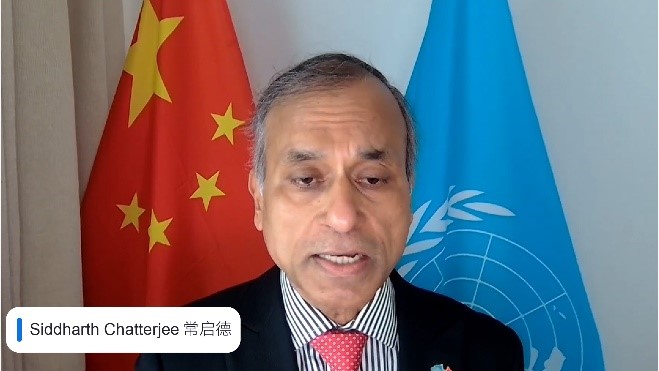On December 22, 2022, the Peking University Global Health and Development Forum 2022 was held with the main theme of Digital Transformation and Development Divides. Co-organized by the Beijing Forum, Asian Development Bank and PKU Institute for Global Health and Development, this Forum brought together world leading scholars, policy researchers and industry leaders from both China and international communities to share their insights and recommendations on the thematic topics, attracted over 10 thousands online viewers participated in the event. Siddharth Chatterjee, Resident Coordinator of the United Nations in China delivered a keynote speech at the session of Global Health and Diplomacy.

Ladies and gentlemen, greetings. I’m pleased to join the Peking University Global Health and Development Forum. I wish to thank the Beijing Forum 2022, Peking University, and the Asian Development Bank for convening this important event and for the invitation to address participants on the topic of global health, digital transformation and development divide. Since its inception, the United Nations has actively promoted and protected health worldwide. Leading that effort within the UN system is the World Health Organization, or WHO, founded in 1948, working with its 194 member states across six regions on the ground in over 150 locations. As part of the UN system, the WHO team strives to achieve its main objective, the attainment by all people of the highest possible level of health. Today, WHO and other UN entities are working in collaboration with health and development partners to achieve the health related targets outlined in the sustainable development goals (SDGs), particularly Goal three, which calls for global action to ensure healthy lives and promote well-being for all at all ages.
It is time to renew and reinvigorate the collaboration
The SDGs underscore the essential role of good health and well-being in achieving sustainable development. Such efforts in securing a healthier future necessitate enhanced multilateral engagement that demonstrates the value of collaboration between diverse actors working in different fields in all countries worldwide. WHO has partnered with its relevant counterparts here in China since 1981. The nature of that cooperation has adapted to China’s changing social and economic context to ensure that the most pertinent health needs of the day are being addressed while reflecting China’s repositioning as a development assistance provider. WHO and China have expanded their global partnerships to support other countries’ efforts in building stronger health systems and responding to international crises and outbreaks. There is tremendous potential for this ongoing collaboration. So it is time for the UN and China, through the efforts of the WHO with the government of China, to renew and reinvigorate this collaboration to address China’s health needs at home and to address the growing needs of countries in the global south.
The pandemic has highlighted the need for collaboration
Ladies and gentlemen, the Covid-19 pandemic has illustrated the importance and possibilities of global health diplomacy in resolving such challenges, but it has also revealed the stress points that prevent us from realizing the full potential of true multilateralism in this space. The pandemic has highlighted the profound need for the spirit of collaboration that prioritizes people over profits and helps over politics. Moreover, that recognizes that we are stronger when we work to lift ourselves and the most vulnerable among us. The emergence of the COVID-19 pandemic has exposed the inadequacies of many health systems and highlighted the urgency of achieving universal health coverage. It has also highlighted the urgency of digital cooperation and demonstrated the interconnectedness of our challenges.
The importance of digital technologies
Digital technologies have been integral to nearly every aspect of the response to the pandemic, including their use in collecting and analyzing population data to drive decision making. The communication of vital information with the public and the continued delivery of health services through online platforms all help us mitigate and respond to Covid-19. There is no doubt that digital technologies must be made a global public good because of their promise, but the challenge it brings require robust international cooperation built on mutual trust and a common commitment to the good governance of digital technologies and access for all so that existing inequalities are not further exacerbated. However, the UN Secretary-General, António Guterres, has said and I quote, “The digital device is threatening to become the new face of inequality, reinforcing social and economic disadvantages suffered by women and girls, people with disabilities, minorities of all kinds.” End of quote. The benefits of digital technologies are failing to reach those who need them the most. This is unacceptable and we must come together to address this.
Digital technologies and health
In 2019, WHO released its global strategy for digital health 2020-2025. The vision of the global strategy is to improve health for everyone everywhere. The strategy sets forth a roadmap for achieving universal health coverage and the health-related SDGs by recognizing the urgent need to address the obstacles faced by the least developed countries in utilizing digital health technologies. As the global health strategy emphasizes while this transformation can be disrupted, digital technologies can potentially enhance health outcomes. But you need to ensure these innovations are accessible to providers and patients in all countries. Where one resides should not determine the quality of healthcare received. Moreover, while digital health should be and must be an integral part of health priorities everywhere, it must be integrated in an ethical, safe, secure, reliable, and sustainable way. Achieving this requires enhanced cooperation based on the fundamental principles of transparency, accessibility, scalability, privacy, and security.
The United Nations family in China stands ready to work with all stakeholders to usher in a new spirit of multilateralism to help realize the vision of the global strategy on digital health and to work closely with the government of China, academia and other partners to achieve the healthy China 2030 action plan. I wish you all very productive discussions, the best for the end of year holiday seasons, and a very happy New Year. Thank you.